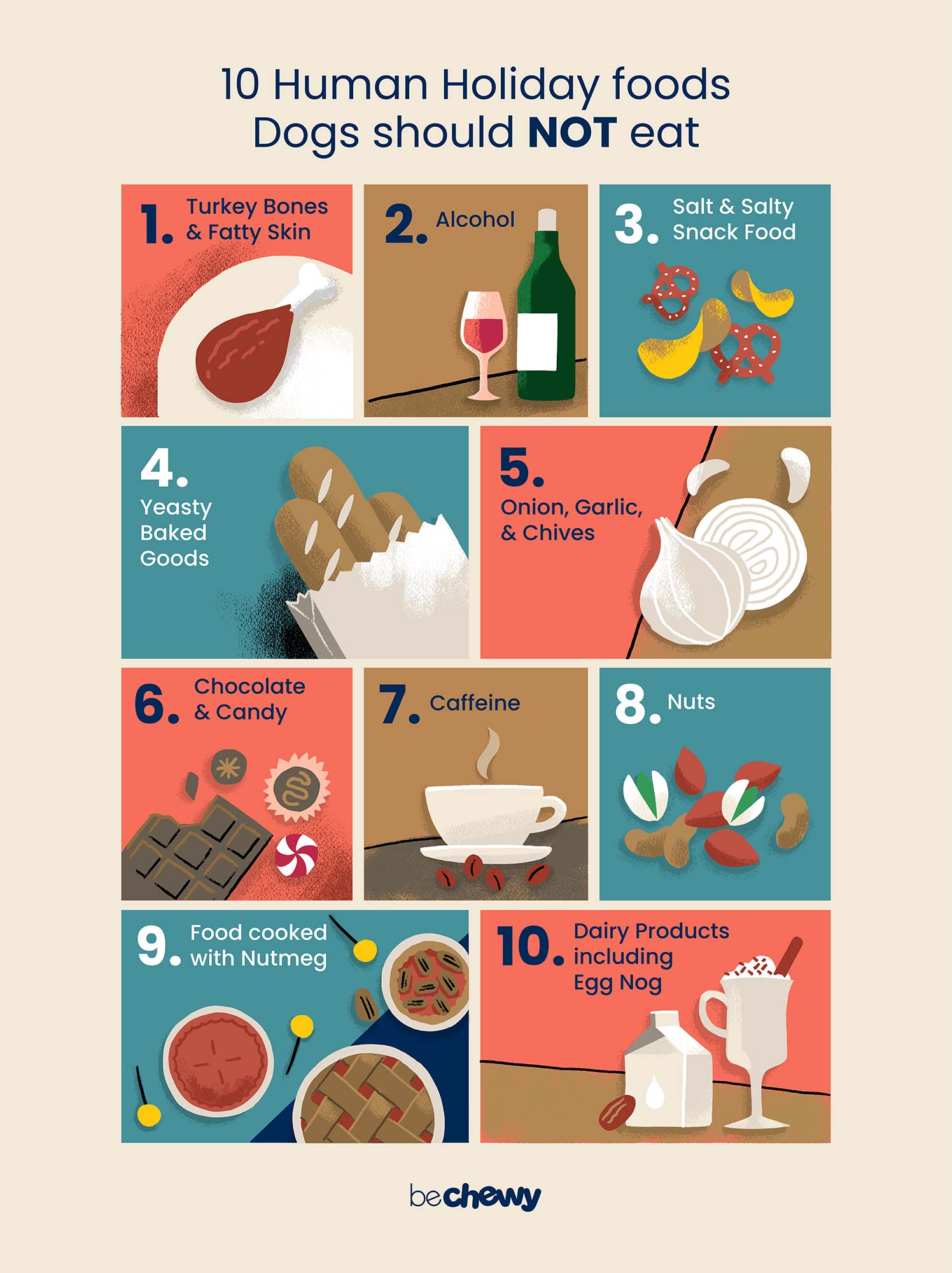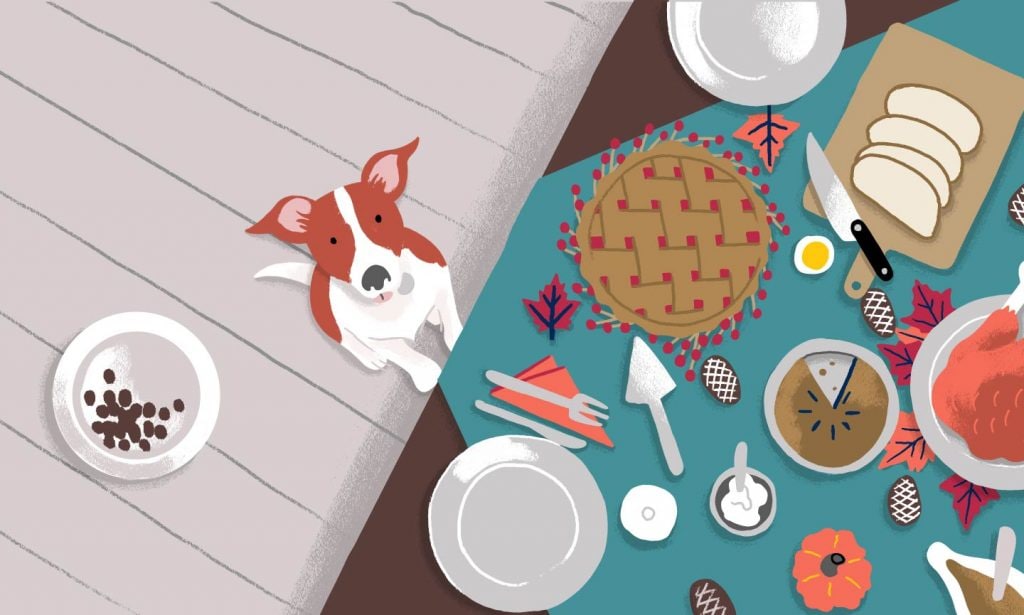As much as we all love the amazing Thanksgiving food and festivities, so do our pets. However, the festive dishes we love so much can be dangerous foods for dogs.
To keep your pup safe and healthy during your Thanksgiving dinner, check out our list of typical autumn and Thanksgiving foods that are toxic for our pets, what clinical signs that you may see, and what you need to do if your dog eats these foods at Thanksgiving or any time of the year.

Onions, Garlic, Chives
Cats are actually more susceptible to the toxic effects of onions, garlic and chives; however, dogs are also at risk.
- The toxicity causes a condition called hemolytic anemia, which is characterized by the bursting of red blood cells circulating through your pet’s body.
- Ingestion can also cause less critical side effects such as gastrointestinal irritation.
- Toxicity is normally diagnosed through history, clinical signs and microscopic evaluation of red blood cells.
Grapes and Raisins
Grapes and raisins are both highly toxic to dogs and can cause serious illness even if a pup eats only a small amount. Read more about canines and grapes and raisins here.
While veterinarians don’t know exactly what substance in grapes and raisins causes this toxicity, recent evidence suggests tartaric acid and potassium bitartrate (cream of tartar) may be to blame.
Symptoms of grape or raisin poisoning typically appear within six to 12 hours after consumption. If your dog experiences symptoms, including the following, call your veterinarian immediately.
- Lethargy or weakness
- Vomiting or diarrhea
- Increased drinking and urination (or no urine production)
- Abdominal pain
- Dehydration
- Bad or strong-smelling breath
- Neurological signs such as head tilts, dizziness, or seizures
However, if you see your dog eat a small amount of grapes or raisins, don’t wait for symptoms to appear. Even if your dog seems to be fine, it’s best to call your vet as a precaution. (If you need help finding a vet near you, use this link.)
Macadamia Nuts
When ingested by dogs even in small amounts, consumption of Macademia nuts can cause:
- hind end weakness
- tremors
- lethargy
- hyperthermia
Signs usually appear within 12 hours of ingestion and can last approximately 12-48 hours. Do not wait to consult your vet.
Nuts
Nuts, including almonds, pecans and walnuts, can also be dangerous foods for dogs.
They contain high amounts of oils and fats, which can cause:
- vomiting
- diarrhea
- pancreatitis
Find out more about walnuts and dogs here.
Milk and Dairy
Be cautious with dairy. Despite what many people believe, pets do not digest dairy products well.
Dogs and cats do not have significant amounts of lactase, the enzyme that breaks down lactose in milk.
Milk and other dairy-based products cause your pet to suffer from diarrhea or other stomach upset.
Here's a dog-safe recipe for homemade eggnog.
Salt and Salty Snack Foods
The large amounts of salt in snack foods such as chips and pretzels can produce excessive thirst and urination, or even sodium-ion poisoning in pets.
Salt toxicity clinical signs include:
- vomiting
- diarrhea
- depression
- tremors
- elevated body temperature
- even death
Alcohol
No amount of alcohol is safe for dogs, cats, small animals or other pets.
Clinical signs include:
- vomiting
- diarrhea
- decreased coordination
- central nervous system depression
- difficulty breathing
- tremors
- abnormal blood acidity
- even death
If your pet has ingested alcohol, see or contact your veterinarian immediately.
Chocolate
No amount of chocolate is safe for dogs, cats, small animals or other pets.
Chocolate contains two ingredients that are toxic in large quantities: theobromine and caffeine. Different types of chocolate contain different amounts of theobromine and caffeine; therefore, the amount and the type of chocolate your pet eats plays a role in its toxic effects.
- Darker chocolate is more dangerous than milk chocolate.
- White chocolate has the lowest level of theobromine.
- Baking chocolate contains the highest.
Clinical signs of chocolate toxicity include:
- diarrhea or vomiting from the high fat content in the chocolate
- restlessness
- hyperactivity
- muscle twitching
- tremors
- increased drinking and urination
- excessive panting
- irritability
- increased heart rate
- abnormal heart rhythm
If your pet has ingested alcohol, see or contact your veterinarian immediately.
Learn more about why chocolate is a dangerous food for dogs.
Raw or Undercooked Meat, Eggs and Bones
Raw meat and raw eggs can contain bacteria such as salmonella and E. coli that can be harmful to pets and humans.
Pets can choke on bones, or sustain injury if a bone splinter becomes lodged in or punctures their digestive tract.
That makes all of the above dangerous foods for dogs. To help your dog satisfy their craving for bones, try 100 percent natural Bones & Chews marrow bones instead—they're produced to be safe for dogs to chew.
Yeast Dough
When pets digest raw yeast dough, the dough can expand and rise in the GI tract, causing gas to accumulate. This can be painful and cause the stomach to bloat, and potentially twist, becoming a life-threatening emergency.
In addition, the yeast produces ethanol as a by-product, and a dog ingesting raw dough may become drunk, with all the same risks as described in the section on alcohol above.
If your pet has ingested yeast-based raw dough consult with your veterinarian immediately.
If you suspect your dog has eaten a dangerous food, or notice signs of poisoning like the ones described above, see or contact your vet. You can also call the ASPCA's Animal Poison Control Center(888-426-4435) or the Pet Poison Helpline (855) 764-7661), both of which operate 24 hours a day.
FAQs
A: Yes and no. Plain roasted turkey is part of many commercial dog foods and is not toxic to canines. However, few of us roast a turkey without added butter, spices and stock make with onions and garlic.
Here are a few tips for safely serving turkey to your dog:
- Skip the skin, which is fatty, and any bones, which can cause digestive issues.
- A small serving (a slice) is enough.
- Always talk to your vet about adding food scraps into your dog’s diet, especially if your dog has a preexisting health conditions like diabetes.
- Do not feed "sides" such as stuffing or casseroles that contain other ingredients such as breads, onions, garlic or spices.
Despite the many dangerous foods for dogs that pose risks at Thanksgiving, there is no need for your pup to feel left out. Let them indulge on Thanksgiving with pet-safe treats and dog food easily accessible during the holiday festivities.
Use these tips (and share with other pet parents) to help avoid sick trips to the veterinarian—especially during Thanksgiving, when you should be spending time being grateful with your closest friends, family, and of course, your pets.
Share:









